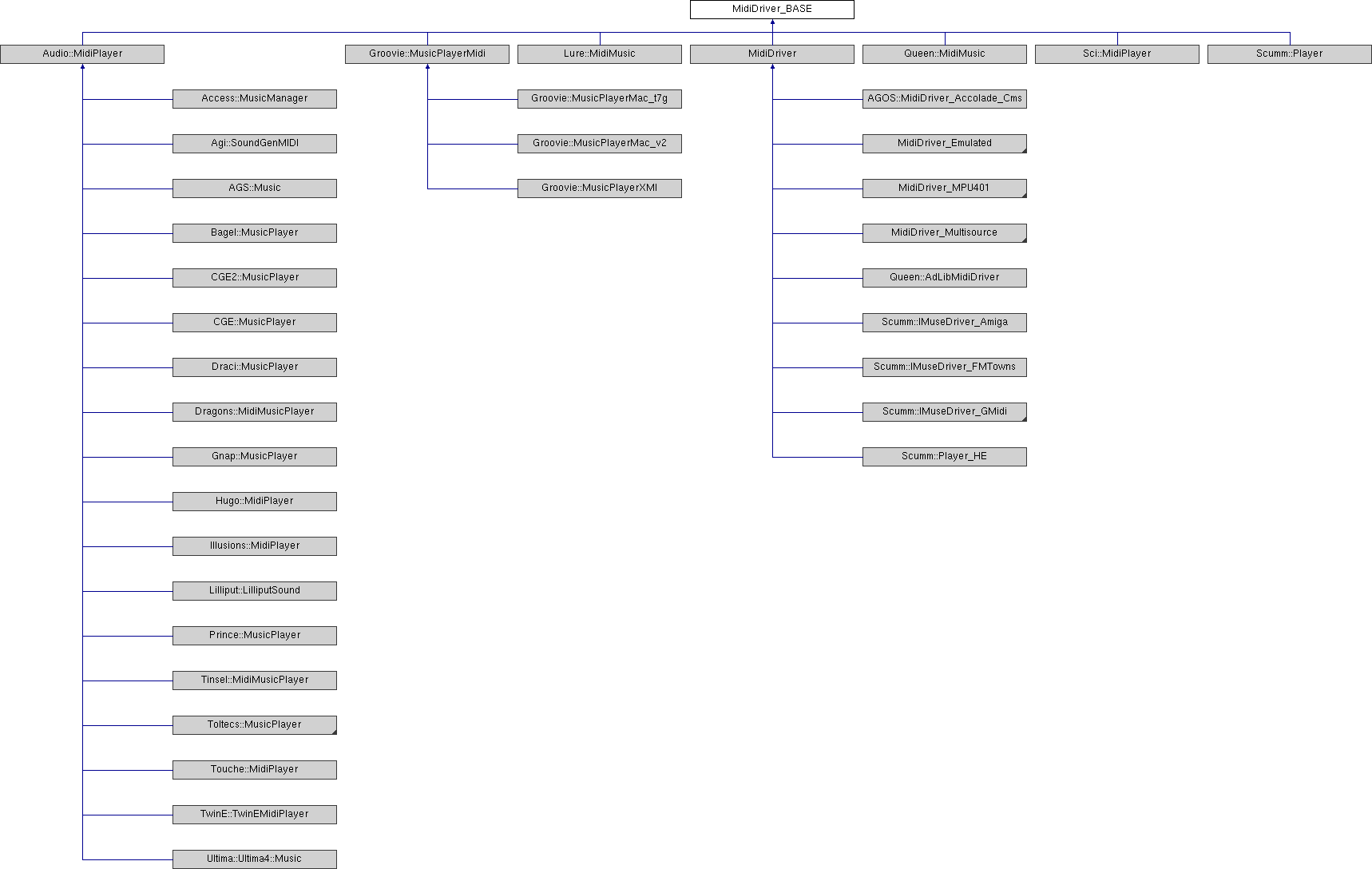|
| virtual void | send (uint32 b)=0 |
| |
| virtual void | send (int8 source, uint32 b) |
| |
| void | send (byte status, byte firstOp, byte secondOp) |
| |
| void | send (int8 source, byte status, byte firstOp, byte secondOp) |
| |
| virtual void | sysEx (const byte *msg, uint16 length) |
| |
| virtual uint16 | sysExNoDelay (const byte *msg, uint16 length) |
| |
|
virtual void | metaEvent (byte type, const byte *data, uint16 length) |
| |
| virtual void | metaEvent (int8 source, byte type, const byte *data, uint16 length) |
| |
| virtual void | stopAllNotes (bool stopSustainedNotes=false) |
| |
| virtual bool | isReady (int8 source=-1) |
| |
|
|
static const uint8 | MIDI_CHANNEL_COUNT = 16 |
| |
|
static const uint8 | MIDI_RHYTHM_CHANNEL = 9 |
| |
|
static const byte | MIDI_COMMAND_NOTE_OFF = 0x80 |
| |
|
static const byte | MIDI_COMMAND_NOTE_ON = 0x90 |
| |
|
static const byte | MIDI_COMMAND_POLYPHONIC_AFTERTOUCH = 0xA0 |
| |
|
static const byte | MIDI_COMMAND_CONTROL_CHANGE = 0xB0 |
| |
|
static const byte | MIDI_COMMAND_PROGRAM_CHANGE = 0xC0 |
| |
|
static const byte | MIDI_COMMAND_CHANNEL_AFTERTOUCH = 0xD0 |
| |
|
static const byte | MIDI_COMMAND_PITCH_BEND = 0xE0 |
| |
|
static const byte | MIDI_COMMAND_SYSTEM = 0xF0 |
| |
|
static const byte | MIDI_CONTROLLER_BANK_SELECT_MSB = 0x00 |
| |
|
static const byte | MIDI_CONTROLLER_MODULATION = 0x01 |
| |
|
static const byte | MIDI_CONTROLLER_DATA_ENTRY_MSB = 0x06 |
| |
|
static const byte | MIDI_CONTROLLER_VOLUME = 0x07 |
| |
|
static const byte | MIDI_CONTROLLER_BALANCE = 0x08 |
| |
|
static const byte | MIDI_CONTROLLER_PANNING = 0x0A |
| |
|
static const byte | MIDI_CONTROLLER_EXPRESSION = 0x0B |
| |
|
static const byte | MIDI_CONTROLLER_BANK_SELECT_LSB = 0x20 |
| |
|
static const byte | MIDI_CONTROLLER_DATA_ENTRY_LSB = 0x26 |
| |
|
static const byte | MIDI_CONTROLLER_SUSTAIN = 0x40 |
| |
|
static const byte | MIDI_CONTROLLER_PORTAMENTO = 0x41 |
| |
|
static const byte | MIDI_CONTROLLER_SOSTENUTO = 0x42 |
| |
|
static const byte | MIDI_CONTROLLER_SOFT = 0x43 |
| |
|
static const byte | MIDI_CONTROLLER_REVERB = 0x5B |
| |
|
static const byte | MIDI_CONTROLLER_CHORUS = 0x5D |
| |
|
static const byte | MIDI_CONTROLLER_RPN_LSB = 0x64 |
| |
|
static const byte | MIDI_CONTROLLER_RPN_MSB = 0x65 |
| |
|
static const byte | MIDI_CONTROLLER_ALL_SOUND_OFF = 0x78 |
| |
|
static const byte | MIDI_CONTROLLER_RESET_ALL_CONTROLLERS = 0x79 |
| |
|
static const byte | MIDI_CONTROLLER_ALL_NOTES_OFF = 0x7B |
| |
|
static const byte | MIDI_CONTROLLER_OMNI_ON = 0x7C |
| |
|
static const byte | MIDI_CONTROLLER_OMNI_OFF = 0x7D |
| |
|
static const byte | MIDI_CONTROLLER_MONO_ON = 0x7E |
| |
|
static const byte | MIDI_CONTROLLER_POLY_ON = 0x7F |
| |
|
static const uint16 | MIDI_RPN_PITCH_BEND_SENSITIVITY = 0x0000 |
| |
|
static const uint16 | MIDI_RPN_MASTER_TUNING_FINE = 0x0001 |
| |
|
static const uint16 | MIDI_RPN_MASTER_TUNING_COARSE = 0x0002 |
| |
|
static const uint16 | MIDI_RPN_NULL = 0x7F7F |
| |
|
static const uint8 | MIDI_META_END_OF_TRACK = 0x2F |
| |
|
static const uint8 | MIDI_META_SEQUENCER = 0x7F |
| |
|
static const uint16 | MIDI_PITCH_BEND_DEFAULT = 0x2000 |
| |
|
static const uint8 | MIDI_PANNING_DEFAULT = 0x40 |
| |
|
static const uint8 | MIDI_EXPRESSION_DEFAULT = 0x7F |
| |
|
static const uint16 | MIDI_MASTER_TUNING_FINE_DEFAULT = 0x2000 |
| |
|
static const uint8 | MIDI_MASTER_TUNING_COARSE_DEFAULT = 0x40 |
| |
|
static const uint8 | MT32_PITCH_BEND_SENSITIVITY_DEFAULT = 0x0C |
| |
|
static const uint8 | GM_PITCH_BEND_SENSITIVITY_DEFAULT = 0x02 |
| |
|
static const uint8 | GM_REVERB_DEFAULT = 0x28 |
| |
|
static const uint8 | GS_RHYTHM_FIRST_NOTE = 0x1B |
| |
|
static const uint8 | GS_RHYTHM_LAST_NOTE = 0x58 |
| |
TODO: Document this, give it a better name.
| virtual void MidiDriver_BASE::sysEx |
( |
const byte * |
msg, |
|
|
uint16 |
length |
|
) |
| |
|
inlinevirtual |
| virtual uint16 MidiDriver_BASE::sysExNoDelay |
( |
const byte * |
msg, |
|
|
uint16 |
length |
|
) |
| |
|
inlinevirtual |
Transmit a SysEx to the MIDI device and return the necessary delay until the next SysEx event in milliseconds.
This can be used to implement an alternate delay method than the OSystem::delayMillis function used by most sysEx implementations. Note that not every driver needs a delay, or supports this method. In this case, 0 is returned and the driver itself will do a delay if necessary.
For information on the SysEx data requirements, see the sysEx method.
Reimplemented in Scumm::Player, MidiDriver_MT32GM, and Groovie::MusicPlayerMidi.
| virtual void MidiDriver_BASE::stopAllNotes |
( |
bool |
stopSustainedNotes = false | ) |
|
|
virtual |
Stops all currently active notes. Specify stopSustainedNotes if the MIDI data makes use of the sustain controller to make sure sustained notes are also stopped.
Usually, the MIDI parser tracks active notes and terminates them when playback is stopped. This method should be used as a backup to silence the MIDI output in case the MIDI parser makes a mistake when tracking acive notes. It can also be used when quitting or pausing a game.
By default, this method sends an All Notes Off message and, if stopSustainedNotes is true, a Sustain off message on all MIDI channels. Driver implementations can override this if they want to implement this functionality in a different way.
Reimplemented in MidiDriver_ADLIB_Multisource, MidiDriver_MT32GM, Groovie::MusicPlayerXMI, Audio::MidiDriver_Miles_Midi, MidiDriver_Casio, and Ultima::Nuvie::MidiDriver_M_MT32.
